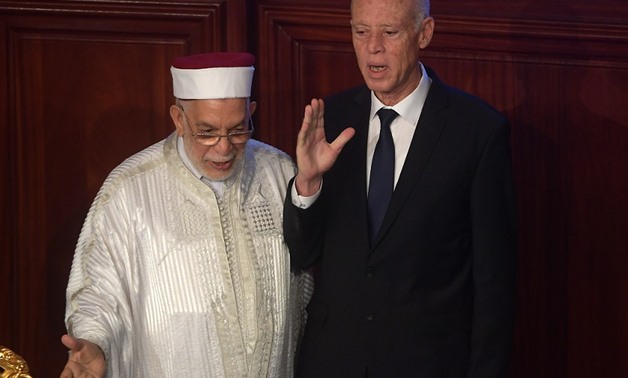
Kais Saied (R) takes the oath of office near acting Tunisian parliament speaker Abdelfattah Mourou on October 23, 2019, in Tunis. Fethi Belaid/AFP
CAIRO – 23 October 2019: Independent politician and retired law professor Kais Saied was sworn in as Tunisia’s president on Wednesday before members of the constituent assembly and other top state bodies, few days after his landslide victory announcement.
Exit polls said about 90% of young voters backed Saied in his election campaign, aspiring for new blood to lead the country out of an economic and political malaise.

Tunisia's new President Kais Saied (R) shakes hands with acting Tunisian parliament speaker Abdelfattah Mourou as he takes the oath of office on October 23, 2019 in Tunis.
Saied, despite being backed by both Islamists and leftists, and his conservative social views, spent so little on his campaign.
Saied’s opponent, Nabil Karoui, on the other hand, did not win despite owning a big advertising platform, a television station, and having ties with the old Ben Ali government.
Karoui faces a trial on corruption charges, which he denies.
"There will be no tolerance in wasting any millime (cent) of the money of our people," Saied said in a speech.
He vowed to protect freedoms, saying, "Those who have nostalgia to go back to the old years only pursue illusions and mirages," he added.
Born on Feb. 22, 1958 in the town of Beni Khiar in Nabeul governorate into a modest and intellectual family.
Saied received his graduation diploma from the International Academy for Constitutional Law in Tunisia when he was 28 years old.
Later, he worked as a law professor at the University of Sousse and became head of the Common Law department before transferring to the Faculty of Juridical, Political and Social Sciences of Tunis from 1999 to 2018.
Saied was not always known as a politician, however, he was well known for his controversial and bold televised interventions regarding constitutional law, particularly during the debates surrounding the constitution's development and amendments.
Saied became secretary-general of the Tunisian Association of Constitutional Law between 1990 and 1995, when he was then promoted to vice president of the organization.
He also served as a legal expert for the Arab League and the Arab Institute for Human Rights, and also as a member of the expert committee that was formed to offer comments to Tunisia’s draft constitution in 2014.
With politicians in Tunis dominating the post-revolutionary era, Saied stresses that "power must belong to people directly.”
Running as an independent social conservative, Saied was one of the first declared candidates in the 2019 Tunisian presidential election.


Comments
Leave a Comment